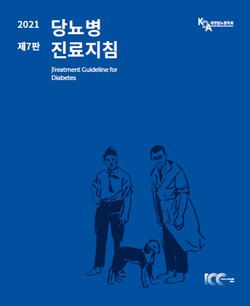Korea’s newly updated diabetes treatment guidelines said physicians should screen diabetes faster, restore blood sugar levels more effectively, and manage blood sugar levels more thoroughly.
The Korean Diabetes Association released the 2021 Treatment Guideline for Diabetes at its 34th Spring Conference and the fifth Korea-Japan Diabetes Forum on Friday. Also, the KDA published a separate summary of the guideline on its website to help clinicians educate patients and manage diabetes systematically.

The KDA divided the level of evidence of the treatment guidelines based on the study design. It also classified the recommendation level into two – general recommendation and limited recommendation.
The KDA emphasized the importance of screening to find those highly likely to be diagnosed with diabetes early.
As patients with type-2 diabetes without any particular symptoms often miss the timing of diagnosis, the latest guideline provides the screening criteria and testing methods for high-risk diabetic patients based on results of the recent local clinical trials.
Accordingly, the KDA’s guidelines additionally recommended considering an oral glucose tolerance test for adults with a fasting blood sugar level of 100-109 mg/dL and a body mass index (BMI) of 23 kg/m2 or more.
The guidelines also integrated oral drugs and injections in antidiabetic medicines and recommended medications separately based on blood sugar control and the presence of comorbidities.
More specifically, when choosing a drug for type-2 diabetes patients, a doctor should generally consider blood sugar lowering effect, hypoglycemia risk, side effects, concomitant diseases (heart failure, atherosclerotic cardiovascular disease, chronic kidney disease), treatment acceptance, age, the value of life the patient pursues, and cost.
The guidelines kept the basic principle of using metformin first and maintaining it unless there is a side effect or contraindication. To lower the risk of glycemic control failure, however, the KDA also recommended an active use of a combination therapy from the beginning of the treatment or an injection-included therapy for a powerful reduction of blood sugar.
Also, if patients accompany heart failure, physicians should consider using SGLT-2 inhibitor with proven cardiovascular benefits first, the guidelines said.
For those accompanying atherosclerotic cardiovascular disease, doctors should consider SGLT-2 inhibitor with proven cardiovascular benefits or GLP-1 receptor agonist first when giving a combination therapy, the KDA recommended. For patients with excessive albumin in urine or decreased glomerular filtration rate, the guidelines recommended an SGLT2 inhibitor with proven cardiovascular and renal benefits even as monotherapy.
The KDA also encouraged physicians to use internationally standardized continuous glucose monitors (CGM) and outpatient blood sugar controlling programs to help patients manage their glucose levels more strictly.
The treatment guidelines newly added the content of CGM and insulin pumps, recommending the use of a CGM in type-1 diabetes patients and type-1 diabetes pregnant women. In type-2 diabetes, it also recommended regular use of a CGM when necessary.
The new guidelines also described the goal of lifestyle correction according to the BMI for the prevention of type-2 diabetes. To correct and maintain the lifestyle, the guidelines recommended using various auxiliary tools, including ICT technology.
Obese diabetic patients are recommended to lose at least 5 percent of their base weight through lifestyle correction, but those who failed can receive anti-obesity treatment, the guidelines said.
Type-2 diabetes patients with BMI at 30 kg/m2 or more can consider undergoing obesity surgery if they failed to lose weight and control glucose through non-surgical treatment, the KDA added.

